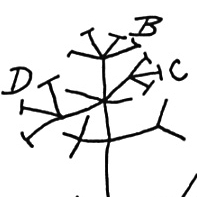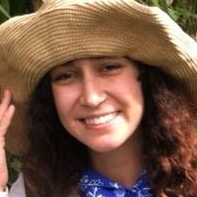EAS Quarterly Newsletter

Report from the Presidents
Dear EAS Members,
Welcome back! We are looking forward to an exciting 2019.
EAS Annual Meetings and Call for Abstracts
Thanks to everyone who attended the very successful 2018 AAA meetings. EAS sponsored 7 sessions, which were well-attended and showcased some great science! Members also braved the smoky air to enjoy the EAS Networking Mixer and the annual EAS Party at local venues.
It’s time to begin thinking about our next EAS meeting at the AAAs, which will be held this year in Vancouver, Canada. The theme for this year’s meeting is Changing Climates. We will have several invited paper sessions, and, as in previous years, we hope to be able to sponsor additional volunteered sessions composed of individual abstracts organized by the program committee or session proposals that were not invited. We had a series of excellent sessions last year. Please help us make this year’s sessions equally exciting!
The AAA deadline this year to begin a submission for both Invited and Volunteered sessions as well as individual paper and poster presentations is April 5th at 3pm EST. Those of you who are planning to submit a session proposal or contribute a paper should send it to Brooke (bscelza@gmail.com) (Chair of our Program Committee) by March 15th. Please submit a session abstract of no more than 500 words, keywords, length of session (normally 105 minutes for 6-7 papers), anticipated attendance, presenter names and roles. Presenters should also submit their titles and abstracts to Brooke by March 15th. The Program Committee will be making its decisions quickly this year, so that you will hear back about your submission by April 1st. After our review, all sessions, volunteered papers, and poster proposals must be officially submitted by organizers and presenters through the official AAA portal by 5th April.
EAS Annual Awards
The 2018 EAS Student Award went to Nicole Naar of UC Davis for her presentation titled ““Es un desmadre”: Making sense of experimental and ethnographic observations of fishing behavior.”
The 2018 EAS New Investigator Award was split between Helen Davis of Harvard University for her presentation “Spatial cognitive ability and mobility among children in two traditional and transitioning populations, the Tsimane of Bolivia and the Twe of Namibia” and Sean Prall of UCLA for his presentation “Effects of Resource Scarcity and Food Security on Partner Preference.” Congratulations to our 2018 winners!
Future of EAS
Finally, we would like to update you on the question of the future of EAS about which we circulated a survey last fall. As many of you are aware, some EAS members are interested in examining the possibility of EAS aligning itself with another organization (such as the AAPA or HBES) instead of with the AAA, while others are interested in considering a joint arrangement of some kind. Still others would prefer to remain in the AAA.
The results of the survey (both quantitative and qualitative) are mixed; many people indicated a preference for moving while others indicated a preference for staying. We discussed this topic in some detail at both the EAS Business Meeting and the EAS Board Meeting. The upshot was that we will be researching options for staying, going, and any potential alternatives, with the goal of presenting options for a vote of the EAS membership sometime in 2019.
Survey results are posted on the EAS website if you would like to take a look. Please feel free to contact Mary Shenk and/or Brooke Scelza if you have thoughts on this matter that you have not already shared. We are taking all opinions quite seriously and plan to make a detailed report prior to any voting.
Best wishes,
Mary Shenk, EAS President
Brooke Scelza, EAS President Elect
Call for AnthroNews Contributions
Call for Newsletter Contributions
We are looking for a current EAS member to author a Feature Article for the 2019 Section News Edition of Anthropology News. This is a print edition, and should be written for a general anthropology audience.
This year, the AN editors are soliciting Section News feature articles themed broadly around the “moon landing”. Authors are encouraged to interpret this theme broadly from their area of expertise. You can write about your own relevant work and related expertise, or use this as an opportunity to delve into some interesting work as a popular science writer. Some examples relevant to this them and evolutionary anthropology include: the unique human cognitive and behavioral adaptions that enable “moon shots”; the relevance of lunar cycles to human or non-human primate sleep and nighttime activities; lunar cycle influences on human and non-human primate behavior and reproductive functioning. Any creative angle is welcomed.
If interested, please contact EAS Section News co-editors Melanie Martin (martinm7@uw.edu) and Katie Starkweather (kstarkweather8@gmail.com). The article will go through a few rounds of edits with the EAS and then AN editors, with a first full draft due to AN on March 29 and the final draft due May 24 (see Deadlines and process below).
And as always, contact Melanie or Katie if you would like to author an online EAS section news column highlighting your work or any other evolutionary anthropology topics!
Regards, Melanie Martin and Katie Starkweather Co-Editors, EAS Section News
Deadlines and process
Please note that inclusion in the print magazine will be on a first come, first served basis. All articles will publish on the AN website, but we might not be able to include all in the magazine. Length: 1,200 words maximum, including title, subtitle teaser, byline, and author bio sketch. Use references sparingly. Alternatively, if you wish to contribute a graphic piece or photo essay—always most welcome indeed—please contact me to discuss length, size, and images or illustrations. Image: One striking image, as large a file size and high a resolution as you can provide (print requires higher quality than the website). Please see the Section News guidelines for a reminder of copyright/permissions for images.
March 29—deadline for submitting article to AN for editorial review.
Send as a Word document directly to me. I will then provide a developmental edit, and return the article to contributing editor/s and author for revision as needed. We might take one or two editorial rounds to finalize a piece.
May 24—submit final revised article.
Please note the March 29 submission deadline is a hard deadline and we will not include submissions arriving after this date.
Upcoming Events
The 14th Annual Conference of the European Human Behaviour and Evolution Association will be taking place April 23-26 in Toulouse, France
American Association of Physical Anthropologists/ Human Biology Association Annual meetings March 27-30 in Cleveland, Ohio
Recent Member Publications
Biological and Evolutionary Perspectives in American Anthropologist: An Editorial Provocation By: Adam P. Van Arsdale and Mary K. Shenk
Explaining marriage patterns in a globally representative sample through socio-ecology and population history: A Bayesian phylogenetic analysis using a new supertree By: Riana Minocher, Pavel Duda, & Adrian V. Jaeggi
Broadening horizons: Sample diversity and socioecological theory are essential to the future of psychological science By: Michael Gurven
Applicability of the Investment Model Scale in a natural‐fertility population By: Jeffrey Winking, Paul W. Eastwick, Leigh K. Smith, & Jeremy Koster
Other Relevant Publications
By: Maria Bleil, Paul English, Jhaqueline Valle, Nancy F. Woods, Kyle D. Crowder, Steven E. Gregorich, & Marcelle I. Cedars
Effective Population Size By: Jada Benn Torres
Job Postings
Graduate student opportunity to conduct fieldwork in Bolivia with the Tsimane including state-of-the -art bioimaging and physical activity assessment. Multi-year, compensated (travel, monthly stipend, per diem), and part of collaborative team already doing long-term research
Boise State is looking to hire a new lecturer of Anthropology
Other Media
University of Washington biological anthropology graduate students Delaney Glass, Miguel Ochoa, Anwesha Pan, and Hannah Zaehringer created a Wikipedia page on Human Reproductive Ecology
EAS member Courtney Meehan featured in a Sausage of Science podcast episode
Daniel Nettle’s series of blogposts is now published as an open access ebook: Hanging on to the Edges: Essays on Science, Society and the Academic Life
What Star Trek Can Tell Us About Genetics and Evolution Article from: Duke Today
Podcast: Sausage of Science Zachary Dubois on Transgender Experience & Health Podcast from: Sausage of Science
What Can Fossils Tell Us About Early Human Diets? By: Briana Pobiner

